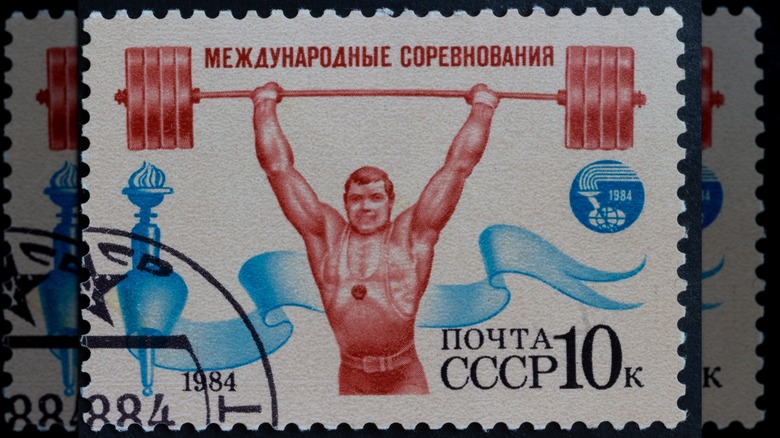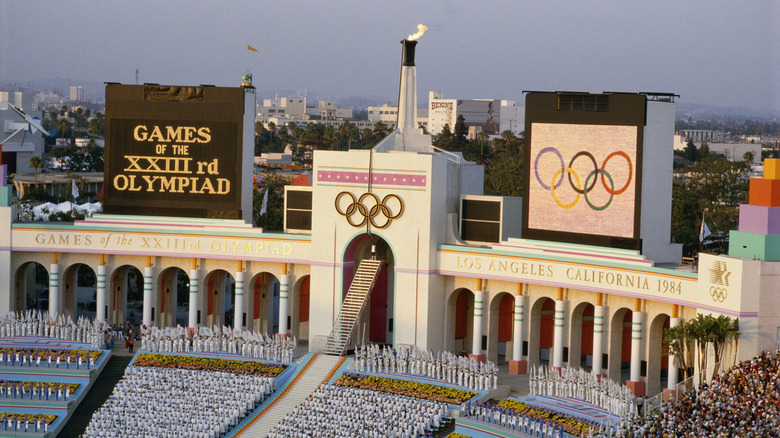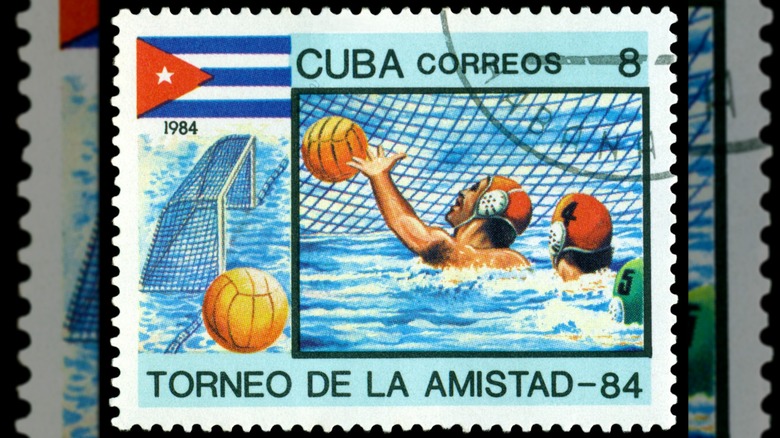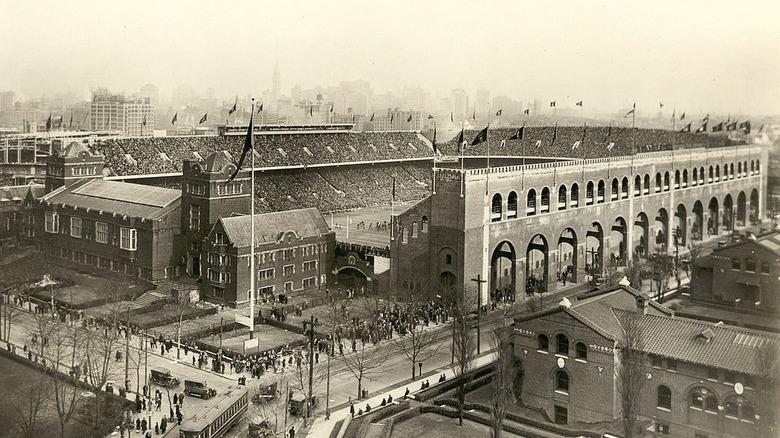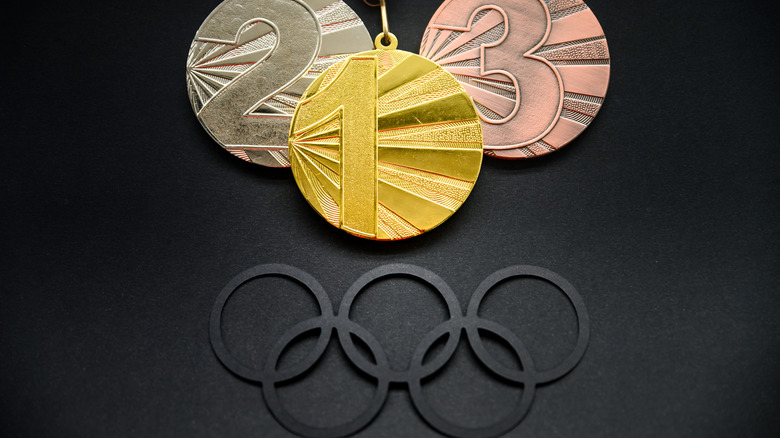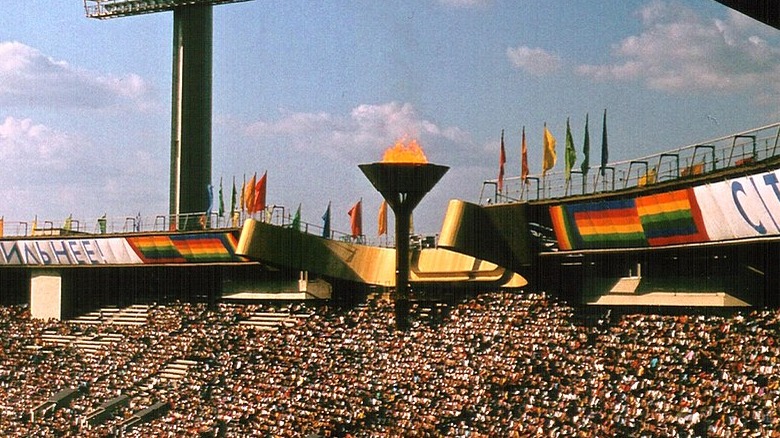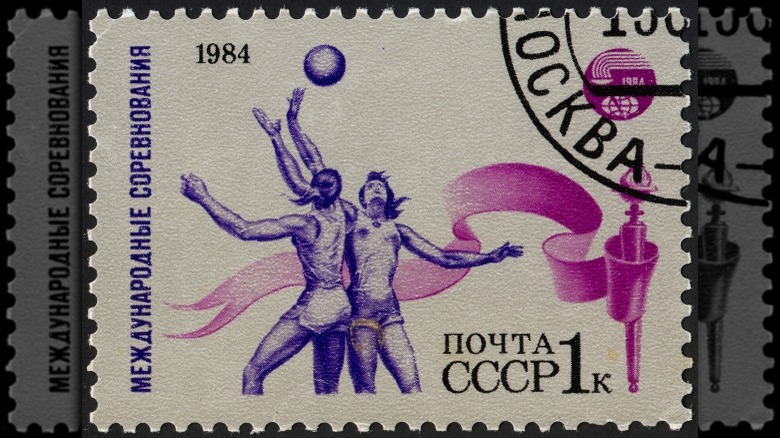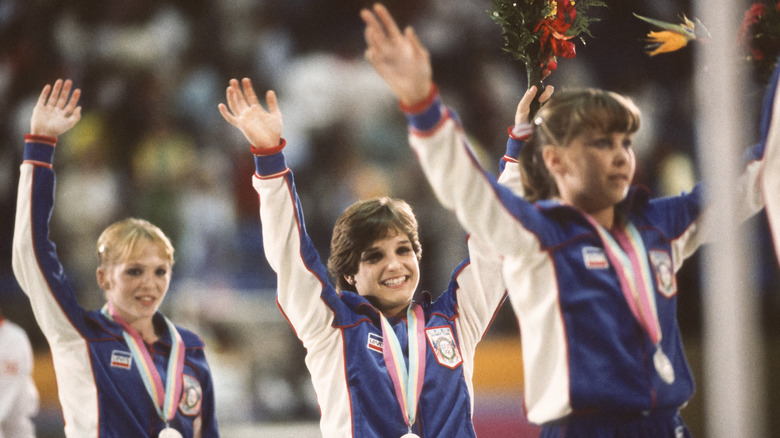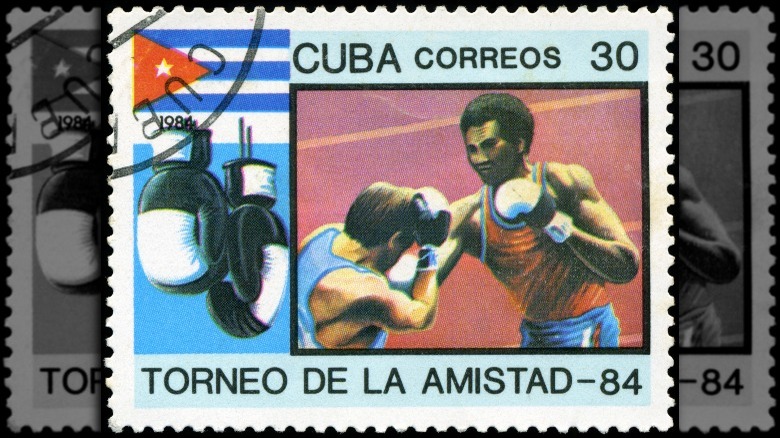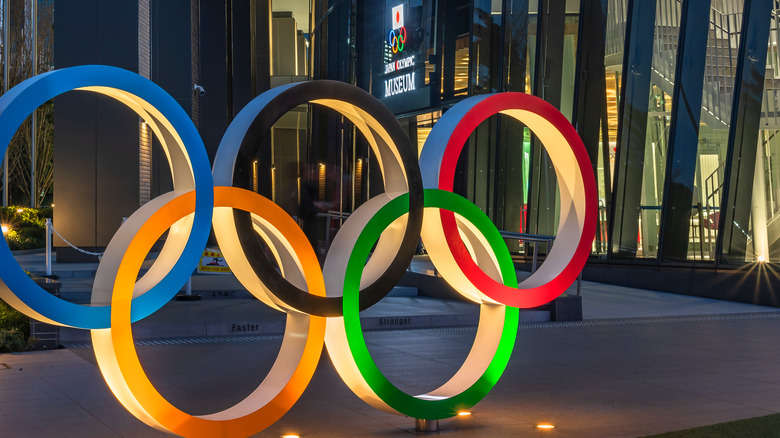The Untold Truth Of The 1984 Friendship Games
It's 1984 (the actual year in history, not the novel by George Orwell), and excitement is in the air. There's no shortage of pomp and circumstance at these opening ceremonies — music and singing, a parade filled with gymnasts dressed in colorful outfits, an international sporting event officially getting its start with the lighting of the eternal flame, licks of fire leaping into the air from the cauldron crafted for the 1980 Moscow Olympic Games (via the New York Times).
Wait a minute. The cauldron from the 1980 Moscow Games? Wasn't this supposed to be 1984? And is it not the Olympics?
And wait just another minute. The song that's being sung, it's going something like ”To a sunny peace, yes, yes, yes. To a nuclear blast, no, no, no.” Yeah, that definitely doesn't really sound like the kind of thing you'd hear from the Olympics. Just a little more nuclear warfare than you'd really expect. And the eternal flame — it didn't come from Athens. Instead, it came from the Kremlin, and was meant to commemorate those who died in World War II.
So then, what's the deal here? What's this weird not-Olympics opening ceremony? Well, what you just read is a bit of the opening ceremonies from the 1984 Friendship Games (not the 1984 LA Olympic Games!), which has a history all its own.
The 1984 Olympic boycott led to the Friendship Games
The Cold War. That's the reason for the Friendship Games, in just three words. Come on, this was the 1980s. Of course it was the Cold War to blame.
But, alright, we can get into things a little more deeply. The 1984 Olympics was just perfectly situated time-wise to coincide with rising tensions in a general sense (Detente's cooled-down tensions couldn't last forever). Where the Olympics were concerned, there was the U.S. boycott of the 1980 Moscow Olympics, which might have sowed the seeds of vengeance. In the direct lead-up to the 1984 Olympics, there were a couple more logistical problems, like Soviet athletes being housed in a Soviet ship docked just off the coast of LA — an understandably concerning idea to the U.S. (via "Boycott of the Los Angeles 1984 Olympic Games as an Example of Political Play–Acting of the Cold War Superpowers").
Another big one was an openly anti-Soviet group called the Ban the Soviets Coalition. Explained by History, the group just didn't want the Soviets showing up to the Olympic Games at all, and they wanted to ensure that at all costs. Fears of that group's intentions were one of the big things actually cited by the Soviets for boycotting the Olympics.
Shortly after the Soviet Union announced its boycott, many other Eastern Bloc nations followed suit, and without the Olympics that many athletes had been training for, the Friendship Games, or Friendship '84, was arranged instead.
A decent number of countries participated in the Friendship Games
Just to be completely clear, the Friendship Games in 1984 weren't exactly some small, off-shoot alternative Olympics or something like that. It was a whole, well-attended event, and the numbers are fairly impressive. Sure, it wasn't on the same scale as the Olympics, but that's almost an unfair comparison; the boycott led to this huge effort to make the LA Olympic Games even bigger, and it shattered records by playing host to 140 different countries (via Los Angeles Times). "Friendship-84' – Stolen Dreams: The socio-political perspective and legacy of 'Soviet Olympia''" reports that more than 7,000 athletes were in attendance.
As for the Friendship Games, well, according to UPI, the number of athletes sat at around 2,000 — not 7,000, but still a pretty sizable turnout, all the same. Those athletes represented 40 different countries, including Eastern Bloc nations like the Soviet Union (ah, yes, what a shock, right?), Poland, and Bulgaria, but also countries from a little further away, namely Mongolia, North Korea, and Cuba (which was also approached by Olympic officials, interestingly enough).
Want to know something sort of surprising, though? Participants in the Friendship Games didn't just come from boycotting countries. Actually, a handful of countries that competed in the Olympics also headed over to the Friendship Games — Canada, Austria, Italy, India, Denmark, and Romania (the only Eastern Bloc nation to compete in the Olympics that year).
The Friendship Games isn't the only one of its kind
The 1984 boycott of the Olympics and the subsequent Friendship Games are pretty big things in history. The funny thing, though, is that this entire thing really isn't all that unique.
Just four years earlier, the U.S. had boycotted the Moscow Olympics. DW describes it largely as a response to the Soviet Union's decision to deploy its armed forces in Afghanistan. The U.S. under Jimmy Carter spearheaded the boycott, and a handful of countries joined, like Japan and Canada, though many major European countries decided against it.
And, okay, you're right, that's just a boycott — it's not like that's exactly the same as what happened in 1984. But here's the thing: similar to the Soviet Union deciding to host the Friendship Games, the 29 boycotting countries in 1980 held their own alternative Olympics, the Liberty Bell Classic, held in Philadelphia (via The Daily Pennsylvanian). It all came together pretty quickly, based on ideas passed around the boycotting countries. Congress allowed for $10 million to be used to put on the event, with Philadelphia and its Franklin Field chosen as the site of a massive track and field competition. Now, compared to the Olympics, it didn't compare. Not even a little. But it did become a small point of national pride, as well as the largest track meet held in the U.S. since the Olympics in 1932.
The results of the Friendship Games seemed really impressive
When the Friendship Games kicked off, they really seemed to do so with a bang. In short, the Friendship Games athletes seemed to blow away their Olympic counterparts. Within the first couple of days, winners of the track and field events in the Friendship Games were beating Olympic gold medalists in their times and results. Hammer, javelin, shot put, pole vault, discus, and both the 20- and 50-kilometer walk saw the Friendship Games champions appearing to outdo Olympic gold medalists, and that was just on the very first day (via UPI).
All told, this happened over 60 times over the course of the Friendship Games, as reported by the Washington Post, and more records were broken in Friendship '84 than in the Olympics. That said, more of those super impressive results came early in the Friendship Games; for some reason, that momentum seemed to die off eventually.
Naturally, that apparent athletic prowess made a pretty decent statement, with Pravda, the Soviet government newspaper saying that those results proved that "Socialist society provides more favorable facilities for the human beings' all-round physical and spiritual development.” (via the New York Times). Bold claims, if nothing else.
Not everyone believed the results from the Friendship Games
Given that athletes in the Friendship Games seemed to so easily outdo their Olympic counterparts, the results from all of those events got quickly called into question. After all, some Friendship Games athletes getting better times or scores wouldn't be too surprising, but a really extreme sort of dominance? Was that a sign of something fishy?
Of course, some observers really did believe something was up. Per the Washington Post, there was plenty of anger, with some sports professionals calling comparisons between results "impossible" or "unfair." Maybe the differences came from the varying facilities, such as the type of floor — wood or cement — for cycling, or whether the sports were taking place indoors or not, which could have played a potential part in sports like cycling or swimming. Because, you know, the weather.
Doping was another question that came up, with some basically accusing the Soviets of allowing drugs and steroids. Apparently, no one outside of the Eastern Bloc was privy to many details of any drug tests that might have taken place, leading to questions of how strict they were, if there were any at all. If nothing else, no one heard about anyone actually being disqualified for steroid use, which seemed sort of suspicious. And if there wasn't any sort of drug testing, what's the point of trying to compare athletes across the two events?
The Friendship Games weren't marketed as an alternative Olympics
On first glance, it's easiest to explain the Friendship Games as an alternative version of the Olympics, held in 1984 for Eastern Bloc athletes who weren't allowed to compete in LA. Per the New York Times, there was even an opening ceremony, complete with the lighting of an eternal flame, after all!
But, officially, the Friendship Games weren't actually referred to by the Soviet Union as an alternate version of the Olympics. UPI explains that a spokesman for the Soviet Sports Committee directly refuted any claim like that, saying that the Friendship Games were "part of the tradition of [their] sporting events." They weren't put together to try and compete with the Olympics, but were just a response to anti-Soviet hostilities that prevented Eastern Bloc athletes from competing. Plus, as Cold War: LA adds, the Friendship Games were specifically timed to not interfere with the Olympics, starting before and ending after them, taking a break while the Olympic Games took place. Why? It was probably to ensure that they didn't get on the bad side of the International Olympic Committee.
All that said, not everyone actually believed in this whole "not an alternative Olympics" story. To many, there were just too many similarities in the symbols and ceremonies for it to be anything but intentional competition. It was just like claims from the Soviets that this wasn't technically a boycott — a way of presenting information to make themselves look better.
The Friendship Games were probably planned quickly
The 1984 boycott of the LA Olympics was kind of strange, the more you get into it. On its surface, it seems like revenge for the U.S. boycott of the Moscow Olympics four years earlier, but closer examination of political tensions at the time makes things potentially more murky.
In particular, "Boycott of the Los Angeles 1984 Olympic Games as an Example of Political Play–Acting of the Cold War Superpowers" tells us that, up until early 1984, the Soviet Union seemed to have every intention to take part in the LA Olympics. The Soviets explicitly said as much, with some officials even complimenting the organizers of the LA Olympics for their impressive work. If the sole reason for the boycott had been in retaliation for the other boycott four years earlier, then why would the Soviets say otherwise? And if the socialist state didn't plan to boycott, it probably wouldn't have planned for its own event, right?
It really seems like the Friendship Games were put together quickly, and reports from Poland seem to support that. According to "Friendship-84' – Stolen Dreams: The socio-political perspective and legacy of 'Soviet Olympia'", Poland didn't officially pull out of the Olympics until the last minute (mid-May of that year), and the country had already put together all the gear for its athletes to use in the Olympics. Other East Bloc countries were similar, not announcing their decision to boycott until just before the Olympic Games started.
Opinions on the Friendship Games varied
Let's just get this straight from the get-go: we're not talking about the whole political end of this discussion right here. That is its own entire debate; this has to do with other opinions, like those from the athletes, because there wasn't exactly any consensus on it.
Some were all for it, like Sergei Bubka — world record pole vaulter — who was quoted in the New York Times as saying that he was disappointed in the Olympics for being so accepting of anti-Socialist hysteria. He saw the Friendship Games as a way to show "the strength of athletes from Socialist countries and their loyalty to the Olympic ideals," unlike the Olympics themselves. Even some Olympic athletes agreed, if for different reasons. U.S. Olympic track and field coach Brooks Johnson was quoted in the Washington Post as saying that there should continue being two Olympics, because they don't "promote good will and friendship, anyway."
Others, though, weren't as into the idea. "Friendship-84' – Stolen Dreams: The socio-political perspective and legacy of 'Soviet Olympia'" reports that Polish athletes were shocked by the announcement of the boycott, and a lot of them didn't really believe that the boycott was valid at all. Everything about this whole boycott business seemed sort of pointless, and many hoped another wouldn't happen again in the future. Many Olympic athletes agreed, missing the opportunity to see their friends, and some of them writing to those friends in Eastern Bloc countries to say that they wanted to all be able to compete together again.
The Friendship Games were held all throughout the Eastern Bloc
For all that the Friendship Games seemed like a pretty direct parallel to the Olympics overall there's actually one somewhat strange difference.
When thinking about the Olympics, you'd probably link each of the events pretty heavily with the city they're taking place in. Rio 2016, Tokyo 2020, Paris 2024, to name a few of the summer Olympics.
The Friendship Games weren't like that, though. Yes, the eternal flame was lit in Moscow, using the cauldron from the 1980 Olympics (via the New York Times), and the city of Moscow is pretty often referenced with regard to the Friendship Games, but it wasn't actually the host city. In fact, it was just one of three cities that officially opened the Friendship Games, with the other two being Tallinn and Prague (via UPI).
As for the events themselves, they were held in a bunch of different locations across the Eastern Bloc and other socialist nations worldwide. "Friendship-84' – Stolen Dreams: The socio-political perspective and legacy of 'Soviet Olympia'" details the entire list: Moscow had swimming and shooting while Tallinn had sailing, North Korea had table tennis, Cuba had boxing, Bulgaria and Czechoslovakia both had gymnastics, and that's nowhere near everything. Nine different countries actually hosted various different sports, and things like financial impact were apparently considered, at least in the case of Poland (which was going through a recession).
Athletes got the short end of the stick
While it's not generally too hard to find word about the whole political context of the Friendship Games, there's another side of the event and the boycott in 1984 that, surprisingly, doesn't seem to get talked about as much. Namely, the athletes.
In general, the boycott put a lot of the athletes in a really bizarre position. DW explains that, just four years earlier, during the 1980 boycott of the Moscow Olympics, athletes from boycotting countries were still allowed to compete, albeit under the Olympic flag rather than that of their nation. Historically, that's generally been the case, as explained in "Friendship-84' – Stolen Dreams: The socio-political perspective and legacy of 'Soviet Olympia'." But that wasn't true at the 1984 LA Olympics; athletes from boycotting countries weren't allowed even that.
And as for after the Friendship Games? What happened to those athletes? You know how most people see Olympic athletes — many of them are welcomed home as returning heroes after the event. Did that happen after the Friendship Games? Sadly, the answer is not really. In Poland, Olympic medalists were entitled to certain benefits (pensions, and the like), but Friendship Game winners weren't counted on the list of official Olympic winners. They weren't given the same benefits for years (until 2006!) and were generally seen as lesser than their Olympic counterparts, even though, really, it's wasn't their fault that they had to compete at a different event.
The Friendship Games was the worst (and best) example of the Olympics
If you look into the history of the Olympics and the whole intention of them from the start, you'll find something called the Olympic Truce. Per the International Olympic Committee, the idea of this truce originated from an ancient Greek monarch who despaired at the constant conflict plaguing Greece. A trip to the Oracle of Delphi led him to creating a peaceful sporting competition (the Olympics), for which all regional conflict would stop every four years.
A peaceful, effectively apolitical environment was the original intent, but since the revival of the Olympic Games, that's pretty rarely been true. "Political Influence and the Olympic Flame" goes into just how politicized the Olympics have become. The torch relay was created by the Nazis in order to promote the superiority of the Aryan race, the torch relay in 1984 was set up such that it promoted diversity in the U.S., and even the presence of foreign dignitaries at certain ceremonies can make a statement.
So the existence of the Friendship Games sort of makes it the best and worst example of the Olympic intention. It clearly had political motives behind it, completely unlike the meaning of the ancient Olympics (though, granted the Olympic Truce wouldn't be officially reinstated until the 1990s), but entirely similar to the modern Olympic Games. Yet, all the same, it masqueraded as an apolitical event, claiming to have no motive aside from giving athletes a chance to compete (via UPI).
